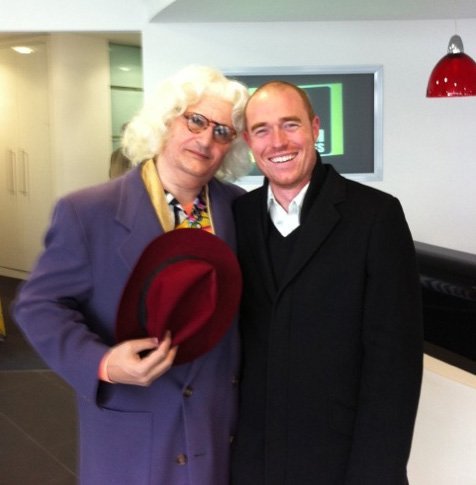My Story
I started my career with roles at Granada and Endemol, where I was embedded into TV development teams to advocate for the growing possibilities of online and mobile technologies. My role was to persuade TV execs of the creative potential of all things interactive - polls, call-ins, gaming, websites - and I quickly became known to TV producers as the acceptable face of the possibilities of interactive, and to the web design and build teams as a more approachable, less pretentious TV person.
While at Endemol, I took advantage of the management team’s desire to experiment with new interactive entertainment formats, and developed and produced a number of UK TV industry firsts, including the first MMS soap opera (remember MMS?), first mobile episode of a TV drama (Totally Frank, T4 - remember T4?) and the BBC’s biggest online-only commission to date at the time, with an £800k price tag, Signs of Life (remember this? Anyone?!).
In fact, I’d left before Signs of Life went into production. I came up with the idea of a soap opera that was closely mapped onto astrological readings, providing viewers with a dramatisation of their horoscope. I oversaw a pilot episode that stylistically took a cue from Twin Peaks (as did every other spooky drama in the noughties), and while it was being mulled at the BBC, I got a phone call from Jimmy Mulville at Hat Trick. Jimmy wanted to set up an interactive department, and he wanted me to head it. At the time I wanted to make Signs of Life, so I said no, but Jimmy kept calling and six months later I came to my senses and agreed to join Hat Trick.
Working at Hat Trick transformed my career in many ways. I formed life long relationships with many colleagues, and learned from some very talented producers - not least Jimmy. I was given the autonomy and freedom to explore whatever opportunities I wanted to, as long as I got commissions and covered my department’s costs. I worked there in total for eight years, won awards for my work and made podcasts, multi-platform TV shows, second screen iPhone apps, hours and hours of YouTube content and several online and interactive dramas. I also took an interest in the many scripts passing through Hat Trick’s comedy and drama teams and began to wonder if maybe I could write scripts at least as good.
Me with Kayvan Novak AKA Brian Badonde in the Hat Trick reception.
So in 2014, in part due to market conditions and in part due to wanting to try new things - including screenwriting - Hat Trick and I amicably went our separate ways. I retained Jimmy as an occasional mentor figure, and set off to try new things. Over the next few years, I worked as a head or director of digital, a consultant, and a producer for a variety of clients including Elton John’s Rocket Entertainment, IMG and lastly BBC in-house productions.
I was hired by BBC Comedy to create a digital strategy to see them leave the public sector and eventually merge with BBC Worldwide to become BBC Studios, Comedy. A key plank to my strategy was to seek opportunities for an output deal of comedy sketches to distribute on social, super-charging talent relations with up-and-comers, and monetising a development slate all in one go.
Me and Gabriel Bisset-Smith, co-writer and director of The Last Hours of Laura K.
The result was Quickies, an 18 month commission for BBC Three, covering 140 individual sketches published largely on the channel’s Facebook page, where the total view count for the entire strand now stands at more than half a billion. We brought many (now) household names to the BBC for the first time, including Rosie Jones, Sindhu Vee, and Helen Bauer. I even managed to get a Quibi development deal for the sketch group Muriel off the back of some very successful sketches (remember Quibi? Doesn’t matter…).
Working on the Quickies at the BBC clarified one thing for me: it made me see that my essential core skill is to take a random bunch of conditions (technological, behavioural, genre, talent, brand) and to work out the rules for creating stories that thrive in those conditions. I use stories here quite vaguely to mean a creatively engaging solution to a problem. With the Quickies, we were able - using the data that came back from the channel and what we could see in the comments - to hone a Facebook sketch playbook that had a much higher success rate than anyone expected. In everything I’ve done since, I’m doing the same thing: taking into account the various conditions presented by a client, and creating the best story to reach the client’s objective. That’s true whether it’s the digital transformation of a live experience to an entertainment TV-like format delivered online; or a new strategy that can change the perception of the Booker Prize from a revered arts prize to a publisher of quality content for literary superfans.
When I worked at Hat Trick, my department was not named after a genre, like all the others (Comedy, Entertainment, Drama). It was, essentially, named to reflect the changing nature of the production to its audience, how viewers interact with entertainment. It may now be more firmly defined as ‘digital’ or ‘social’ media, but it is still interactive, still changing, adapting, renewing. That experience has given me the ability to creatively adapt and renew too. The conditions are forever shifting, but the need to entertain and reach audiences remains the same. I genuinely love helping people find new ways to tell their stories.



